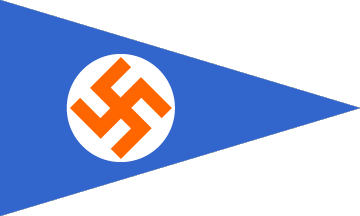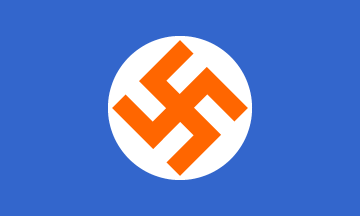 Image by Tomislav Todorovic, 20 March 2012
Image by Tomislav Todorovic, 20 March 2012
Last modified: 2019-08-06 by bruce berry
Keywords: national party | new national party |
Links: FOTW homepage |
search |
disclaimer and copyright |
write us |
mirrors
 Image by Tomislav Todorovic, 20 March 2012
See also:
Image by Tomislav Todorovic, 20 March 2012
See also:
In the 1930's a number of groups sympathetic to Nazism
emerged in South Africa, but perhaps the best known was the South African Nazi
Party or more simply known as the Gryshemde (Grey Shirts in Afrikaans)
because of their paramilitary Sturmabteilung-like uniforms. Their
official names of the "South African Gentile National Socialist Movement," and
the "South African Christian National Socialist Movement," were rarely used. The
South African Nazi Party, which remained active during the 1930s and 1940s, was
founded by Louis Weichardt. Its platform was the basic Nazi anti-Semitic
rhetoric that extreme right-wing groups seem to favour. As the Jews fled
Nazi Germany during the mid-1930s, some relocated to
Cape Town in South Africa
and the Greyshirts were active organizing large and sometimes violent street
protests at this time.
Although Headquartered in Cape Town, there was a "branch office" in
Pretoria and
the Grey Shirts published a newsletter called "The Bulletin" where they
attempted to justify the actions of the national socialists both in Germany and
South Africa. What was unusual about this particular South African extremist
group was that they sought to work with both the Afrikaans and the
English-speaking South Africans. During World War II, although the government
closely monitored Grey Shirts activities, they were largely left alone. By 1949,
the Grey Shirts, after renaming themselves the White Workers Party, gradually
faded from the South African political scene and split into smaller splinter
groups. (Text from "Historical Flags of Our Ancestors").
 Image by Tomislav Todorovic, 20 March 2012
Image by Tomislav Todorovic, 20 March 2012
The flag used by the South African Nazi Party followed the
same design as that used by the Nazis in Germany during the
Third Reich between
1933 and 1945 but with an orange swastika on a white roundel on a light blue
field in both rectangular and triangular versions
Pete Loeser, 20 March 2012